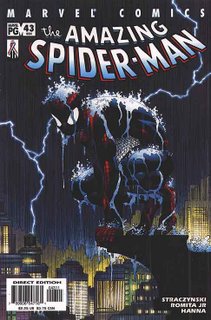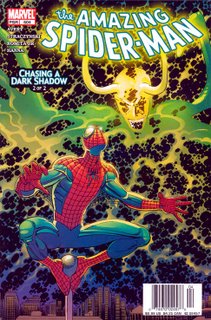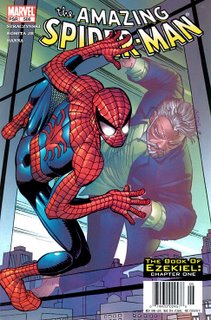'It's (Spider-Man's story) about determining one's own identity in the face of the realization that the world is a cold and potentially dangerous place that might try to decide things for you. The World! Not a MYSTICAL SPIDER-GOD.'
Also:
'If it (Peter getting bitten and receiving the powers) was meant to be, how is it a story about a fairly ordinary guy like the rest of us. If Uncle Ben was meant to die and the ability to save him taken out of his hands by Destiny, how can it be Peter's responsibility?'
 So, is Mr. Craig right? Has Straczynski taken control out of Peter's hands, and in the process destroyed part of the core character? I went to Amazing Spider-Man #507 for some help. In the issue, Peter meets a roughly eight-foot tall mass of brown spiders called the Gatekeeper. Peter gets bitten several times and falls into a sort of dream state where the Gatekeeper explains things to him, specifically why Peter? A few excerpts:
So, is Mr. Craig right? Has Straczynski taken control out of Peter's hands, and in the process destroyed part of the core character? I went to Amazing Spider-Man #507 for some help. In the issue, Peter meets a roughly eight-foot tall mass of brown spiders called the Gatekeeper. Peter gets bitten several times and falls into a sort of dream state where the Gatekeeper explains things to him, specifically why Peter? A few excerpts:'There were so many other on that day, in that room, together, there - with the spider.' That's certainly true.
'Because you were a hunter without teeth. You were chosen for your rage.' Ok.
'Why you? Because of all those who were there that day, there was only one hunter.'
Ok, I can see how one could interpret this to mean that it was destined. But here's the phrase I'm seeing: "there was only one hunter." To me that suggests, that on that day, Peter was simply the only qualified candidate present. Maybe it was that spider's job to pick someone to be the 'totem' as Ezekial described it, but there was nothing that said it had to choose that very day. At least not until it got hit with the blast of radiation. At that point, the spider had no time left to search for the person who best exemplified what the spider-god was looking for, so it chose the best out of the limited field it had available. And on that day, in that place, the field of candidates was one: Peter Parker.
And what was the qualifier? That he had rage. Specifically, that all these years Peter has been picked on and bullied, beaten and humiliated, and he's just had to take it, because he's too weak or there were too many of them. He lacked the power to do anything about. Well, I'll be honest, that description could fit any number of other kids in high school, probably millions, worldwide. Hank McCoy, the Beast, was a smart guy. Before his mutation emerged, there's probably a real good chance he got picked on, being a nerd and all. So couldn't he have sufficed? Maybe, maybe not, but it raises - to me at least - the idea that Peter just drew a good (or bad) hand.
So does all this mean it wasn't destined to occur? No, for all we know, a Celestial altered events so that the spider got hit with radiation leaving Peter to get bitten. Different force behind it, same result. But there's no evidence of that. Another thing there isn't any evidence of is that Uncle Ben was destined to die, at that time, anyway. We've got no proof that a spider-god with only enough power to have one true totem (or is it two? Does Arana count?) has sufficient power to twist things so The Burglar would wind up at the Parkers', so that he could shoot Ben. If you start saying that was predestined, then where do you stop? Captain America was destined to be trapped in ice for how ever many years before the Avengers found him. Bruce Wayne's parents were destined to be shot. I suppose it all boils down to how much control you want to believe you (or your comic characters) have over your (their) life.

One other idea: Who says the Gatekeeper is telling the truth? I brought this up in the original discussion, that spiders in mythology are typically tricksters, and when Spidey teamed up with Loki to fight the chaos goddess, Morwen, she states that Peter, not Loki, is the person she wants to enlist, because Spidey 'has much of the trickster in him'. And she's right. Peter does fight evil a lot, but webbing Jameson's pants to his chair? Playing pranks on the Human Torch? Making fun of the Vulture being bald, or those ugly green and yellow outfits Doc Ock used to wear? None of that is what I'd call fighting evil.
The Gatekeeper said Peter was given the power because once he had it, he would never stop fighting to protect those weaker from harm. He would fight to protect them from the evil. I said it in the original discussion, and I say it now: How does a being of chaos benefit from someone fighting evil? Now kelvin pointed out that chaos is not inherently evil, and he's right (and I've played enough D&D to have remembered that), but it isn't inherently good either. So isn't it more likely that the Gatekeeper told Peter what he wanted to hear? To someone like Peter, "We gave you the power because we knew you'd protect the innocent and fight evil" sounds a lot better than "We gave you the power because you will bring more chaos into the world", which is what you figure a being of chaos would actually be striving for. At the time, though Peter didn't know it, Ezekial was planning to sacrifice Peter, in order to save his own hide. But which one better represents what the spider-god would want? Peter fights evil, but does a lot of things that wouldn't be defined as 'good', because he finds it funny. Plus having enemies who want to keep striking back, or keep trying for world domination, introduces different variables into the world at large. Ezekial uses the power with one goal in mind: furthering his own power. Around Peter he pays lip service to trying to start charities and help people, but he moves with a plan, a definite
 purpose, not chaotic at all. He's like Loki, who for all his talk about being the God of Mischief, is still only interested in one thing: furthering his own power. Sound familar? Loki might occasionally just try to make Thor's life hard, or even aid Thor at times, but in those cases Loki is still just looking out for #1. Like Morwen said, not a true trickster.
purpose, not chaotic at all. He's like Loki, who for all his talk about being the God of Mischief, is still only interested in one thing: furthering his own power. Sound familar? Loki might occasionally just try to make Thor's life hard, or even aid Thor at times, but in those cases Loki is still just looking out for #1. Like Morwen said, not a true trickster.So what does all this mean? Probably not too much, in light of the destruction they're wreaking on Spider-Man right now. But I think that there isn't really enough evidence to support the claim that Straczynski destroyed the idea of guilt and responsibility in Spider-Man by venturing into a more mystical realm. Oddly enough, I think JMS had the best way of putting it, during the conclusion of Spidey's first fight with Morlun, where Peter is pummeling Morlun, while wondering where his powers come from: the spider or the radiation? Was it fate, or not? Peter's conclusion: It doesn't matter, he is who he is. He's going to use the powers the way he always has, regardless of their origin, or of the intentions of anyone who may have had a hand in his getting them. Too bad JMS couldn't just leave it at that.
Hopefully, that's coherent. Thanks to samruby.com for having a complete Spider-Man cover archive, so I'd have some art to break up the long and boring text.





0 komentar:
Posting Komentar